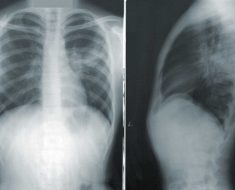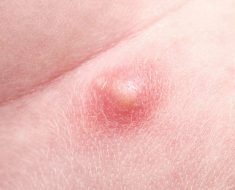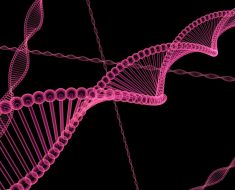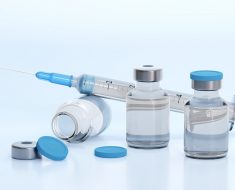Researchers say people with type 1 diabetes who took the BCG vaccine experienced significant decreases in blood sugar levels.

Photo: Getty Images
A tried-and-tested vaccine for an ancient disease has intriguing potential for treating diabetes.
People with type 1 diabetes who took part in a small eight-year study and received injections of the bacillus Calmette-Guérin (BCG) vaccine — used primarily to treat tuberculosis — saw their blood sugar drop to near-normal levels for at least five years.
The BCG vaccine, first developed in 1908, is the most commonly administered treatment for tuberculosis, given to more than 100 million children worldwide each year. It’s also widely used to treat bladder cancer and leprosy.
The study by researchers at Massachusetts General Hospital (MGH) is preliminary, but the possible implications are significant.
Dr. Denise Faustman, a senior study author and director of the MGH Immunobiology Laboratory, told Healthline that the vaccine takes advantage of the weakened tuberculosis virus’s ability to command the body’s immune system to consume glucose molecules.
She said it also inhibits the autoimmune response that underlies illnesses such as type 1 diabetes, multiple sclerosis, and fibromyalgia.
“People generally think that if you want to decrease blood sugar levels, you need to ingest insulin,” said Faustman. “We developed another way to lower blood sugar that’s very safe, using a 100-year-old vaccine. This fills the gap between administering insulin to control blood sugar and restoring blood sugar to a normal range without patients becoming hypoglycemic, which can kill you.”
A phase II clinical trial approved by the Food and Drug Administration (FDA) is currently under way to test the BCG vaccine on a larger group of patients with type 1 diabetes.
Results from the phase I study, which Faustman recently presented at a meeting of the American Diabetes Association, were published in the journal Vaccines.
What the vaccine does
For decades, researchers have known that BCG increases production of tumor necrosis factor (TNF), which kills autoreactive T cells that attack tissues in the body — pancreatic islets, in the case of type 1 diabetes.
It also increases production of regulatory T cells, which inhibit autoimmune response.
Both steps help protect the tuberculosis virus when it settles in the lungs of a human host.
For the first time, Faustman and her colleagues found that administering the BCG vaccine also resulted in a change in the way the body consumes glucose, boosting the immune system to “eat” sugar and reduce blood glucose levels over the course of time.
The BCG treatment, administered in two vaccinations four weeks apart, yielded few results initially.
But patients’ blood glucose levels fell 10 percent three years after treatment and by more than 18 percent after four years.
Eight years out, treated patients had an average blood sugar (HbA1c) level of 6.65, close to the 6.5 considered the threshold for diabetes diagnosis.
Some words of caution
The researchers reported no instances of severe hypoglycemia, or low blood sugar.
The study group was small — nine people at the five-year point and three at the eight-year point.
That fact was noted by the American Diabetes Association and the Joslin Diabetes Center.
“Overall, the findings prompt thought-provoking questions but not definitive answers, and do not provide enough clinical evidence to support any recommended change in therapy at this time,” according to a joint statement from the affiliated organizations.
"What’s exciting about this BCG research is that a simple and cheap product with a long history of safe use could help to cure a serious disease that is otherwise incurable,” Laurie Endicott Thomas, who has written books on vaccines and diabetes, told Healthline.
“However, there is some reason for doubt. If two doses of the BCG vaccine really do cure type 1 diabetes, why hasn’t anyone noticed this effect before? BCG has been widely used for nearly a century.”
Faustman told Healthline that a single dose of BCG might not be sufficient to affect glucose levels.
However, she noted that a Turkish study found reduced levels of type 1 diabetes among children who received three BCG vaccinations compared to those who received one or two vaccinations under the nation’s preventative healthcare program.
Humans have been exposed to tuberculosis for millennia — there’s even evidence of the disease among Neanderthals — according to Faustman.
That might help explain why the virus has such a finely developed self-defense strategy, deeply rooted in the human immune system.
Looking at the immune system
Until the 20th century, people were widely exposed to the virus in food and water, Faustman said, so the BCG vaccine “is kind of restoring normal — this is something that in modern society is no longer with us.”
That corresponds with current theories holding that rising levels of autoimmune illnesses may be related to overuse of antibacterial and antiviral agents as well as decreased exposure to toxins in the environment that are actually beneficial to a healthy microbiome in the human body.
A parallel study, where Massachusetts General Hospital researchers artificially induced type 2 diabetes in mice, also found that BCG could reduce blood sugar levels, suggesting that the treatment could work even with disease that doesn’t involve a faulty autoimmune response.
However, Thomas points out that people with type 2 diabetes don’t need to wait around for a vaccine, since weight loss of any cause can cure the disease.
“It can also be reversed by eating a low-fat, high-carbohydrate diet. A high-carbohydrate plant-based diet helps to bring about big improvements in blood sugar control, even before the person has lost much weight,” she said.
Source: Read Full Article





